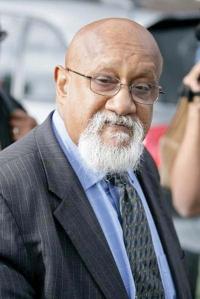December 31, 2019

“Bold. Bright. Bald.”
That was Chuck Turner’s campaign slogan when he ran successfully for Boston City Council in 1999. All true. You had to appreciate the wryness of the third part of the slogan from a man who in public always had a serious face. On Christmas Day, he passed away at age 79.
On April 4, 1968, Martin Luther King was assassinated, sparking riots of despair in Boston and across the country. On April 8, Chuck helped to organize 5,000 mostly African-Americans for a rally at White Stadium in Franklin Park at which were issued 21 demands around community control of the economy and the politics in the black community. In an immediate sense, the demands were unwinnable due to a lack of enough organized African-American power in Boston at the time. But Chuck Turner spent the next 50 years working to make them winnable.
In the late 1960s, he led Roxbury residents as part of a metropolitan campaign to stop the ten-lane I-95/Inner Belt highway expansion from being built through Boston, Cambridge, Somerville, Dedham, and Canton. Because it was viewed as representing progress, highway expansion had never before been brought to a halt.
Chuck helped to organize yet another rally, this time at the State House in January 1969, where some 1,000 gathered to demand that the highway construction be stopped and alternatives considered. Then-Gov. Francis W. Sargent appointed him to co-chair a task force to review the state’s policy here and the panelists ended up recommending against it being built. A month later, Sargent put a moratorium on the highway construction, with the result that many, many homes and small businesses were saved from demolition. Additionally, the funds slated for that highway were used instead to build the new Orange Line.
A large commemorative display of that successful campaign sits right outside of Roxbury Crossing MBTA Station where the highway would have passed through.
Also in the late 1960s, Chuck took up a rest-of-his-life campaign to ensure that African -American and Latino workers received a fair share of construction jobs in Boston, a city where construction unions, for one reason or another, had very few members of color. Chuck organized the United Community Construction Workers, who protested that disparity at construction sites. In response, on May 29, 1976, some 2,000 white construction union members rallied at City Hall against “harassment” by minority groups demanding jobs.
Chuck then came up with an innovative winning strategy. “I realized,” he said at the time, “that we were both fighting for the same thing: jobs. All we had to do was unite the two groups under the employment umbrella of residences to break the power of the suburbs, [which necessitated] an alliance between communities of color and white communities of Boston.” The upshot after some organizing by Chuck and others: the Boston Jobs Coalition, a multi-racial, multi-neighborhood campaign for a Resident Jobs policy in the city.
In the 1979 mayoral election primary, incumbent Kevin H. White faced state Senator Joe Timilty, whom he’d narrowly defeated in 1975, and state Rep. Mel King, who ran on the resident jobs issue. Shortly before the primary, White came out in favor of it, too, instituting a policy mandating that 50 percent of the jobs on private and public development projects go to Boston residents, 25 percent to people of color, and 10 percent to women.
The contractors and construction workers unions challenged the law in court in 1981, winning a state Supreme Judicial Court decision against it. But the US Supreme Court later ruled that the city government had the power to set up such a policy, and it was passed again in 1983.
Years later, another jobs situation appealed to Chuck’s sense of justice. One consequence of the war on drugs in the 1980s and 1990s was passage of punitive and lengthy mandatory minimum sentences for drug convictions. This led to a 400 percent increase in imprisonment in Massachusetts. But once out, most of the released prisoners couldn’t get jobs because employers, who could check through the State CORI data base, refused to hire people with criminal records.
Chuck organized a campaign that won passage of a city ordinance he sponsored to enable former prisoners to get city jobs and positions with companies that had won city contracts. This activity spurred later campaigns at the state level that have brought down the time employers can view CORI records from 15 years for felonies and 10 years for misdemeanors down to 7 years and 3 years, respectively.
Chuck Turner himself served time after he was convicted of bribery for accepting $1,000 for supporting an application for a liquor license. The whole case seemed murky; it seemed unlikely that he would sell out his integrity for $1,000. But he was convicted.
But when he got out, he did not fade away as his detractors assumed he would. He again continued to work with community groups on enforcement of the Resident Jobs policy and on ensuring that the massive Encore casino would meet its goals for hiring people of color. Much progress was made on that situation.
Why did Chuck Turner spend over 50 years in organizing for justice? He had a ready answer for that question: “While I found organizing to be challenging, demanding, and often frustrating, I realized there would be no more fulfilling way of repaying my debt to my ancestors than devoting my life to organizing.”
He never gave up and Boston is a truly a much better city for his efforts.
Lew Finfer is a Dorchester resident and co-director of the Dorchester-based Massachusetts Communities Action Network.



